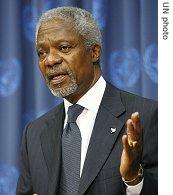-
(单词翻译:双击或拖选)
By Peter Heinlein
United Nations
13 September 2006
U.N. Secretary-General Kofi Annan says most leaders he visited on his recent trip to the Middle East told him the U.S. campaign in Iraq has been a disaster for them. In a wide-ranging news conference, Mr. Annan also said he sees a slight shift in Iran's position on suspending uranium enrichment.
-----
 Kofi Annan at UN press conference, Sept. 13, 2006 |
||
"There were many leaders who felt the Americans should stay until the situation improves, and that having created the problem, they cannot walk away," he said. "Then you have another school of thought, particularly in Iran, that believe the presence of the U.S. is a problem and that the U.S. should leave."
But he said regardless of which outcome the leaders favored, most agreed the enterprise has been harmful to them.
"Honestly, most of the leaders felt the invasion of Iraq and its aftermath has been a real disaster for them, they believe it has destabilized the region," he said.
In an hour-long question and answer session with reporters, Mr. Annan declined to give his own thoughts on whether it is time for a U.S. withdrawal1 from Iraq. He said the issue poses a dilemma2 for American policymakers.
"In a way the U.S. has found itself in a position where it cannot stay and cannot leave, and if it [the U.S.] has to leave, the timing3 has to be optimum, and arranged in such a way that it doesn't lead to even greater disruption or violence in the region," he said.
Mr. Annan also faced a barrage4 of questions about the status of talks on Iran's suspect nuclear program. He spoke5 hopefully about the outcome of talks between European Union foreign policy chief Javier Solana and Iranian negotiator Ali Larijani, and said he believes he has detected a slight change in Iran's rejection6 of calls to suspend uranium enrichment.
"I do note that there is a slight shift, I wouldn't say it's a major shift, a slight shift in the sense that they are now saying that, let's negotiate, suspension will be on agenda and maybe possible during negotiations7, not that it's outright8 rejections," he said.
Mr. Annan said he is urging Iranian leaders to be more forthcoming about their nuclear program, while asking the Security Council to be more patient.
"So I think it's a question of a bit more confidence and each focusing on issue at hand and what it takes to settle without artificial deadlines. That leads to complications," he said.
Mr. Annan said the futures9 of Iran and Iraq will be among the main topics he will discuss with leaders visiting U.N. headquarters next week for the opening of the annual General Assembly debate.
President Bush will address the Assembly Tuesday, along with a host of other leaders, including French President Jacques Chirac and Iranian President Mahmoud Ahmadinejad. Leaders from other hotspots in the Middle East, such as Lebanon and Iraq, will speak later in the week.
 收听单词发音
收听单词发音
1
withdrawal

|
|
| n.取回,提款;撤退,撤军;收回,撤销 | |
参考例句: |
|
|
|
2
dilemma

|
|
| n.困境,进退两难的局面 | |
参考例句: |
|
|
|
3
timing

|
|
| n.时间安排,时间选择 | |
参考例句: |
|
|
|
4
barrage

|
|
| n.火力网,弹幕 | |
参考例句: |
|
|
|
5
spoke

|
|
| n.(车轮的)辐条;轮辐;破坏某人的计划;阻挠某人的行动 v.讲,谈(speak的过去式);说;演说;从某种观点来说 | |
参考例句: |
|
|
|
6
rejection

|
|
| n.拒绝,被拒,抛弃,被弃 | |
参考例句: |
|
|
|
7
negotiations

|
|
| 协商( negotiation的名词复数 ); 谈判; 完成(难事); 通过 | |
参考例句: |
|
|
|
8
outright

|
|
| adv.坦率地;彻底地;立即;adj.无疑的;彻底的 | |
参考例句: |
|
|
|
9
futures

|
|
| n.期货,期货交易 | |
参考例句: |
|
|
|















